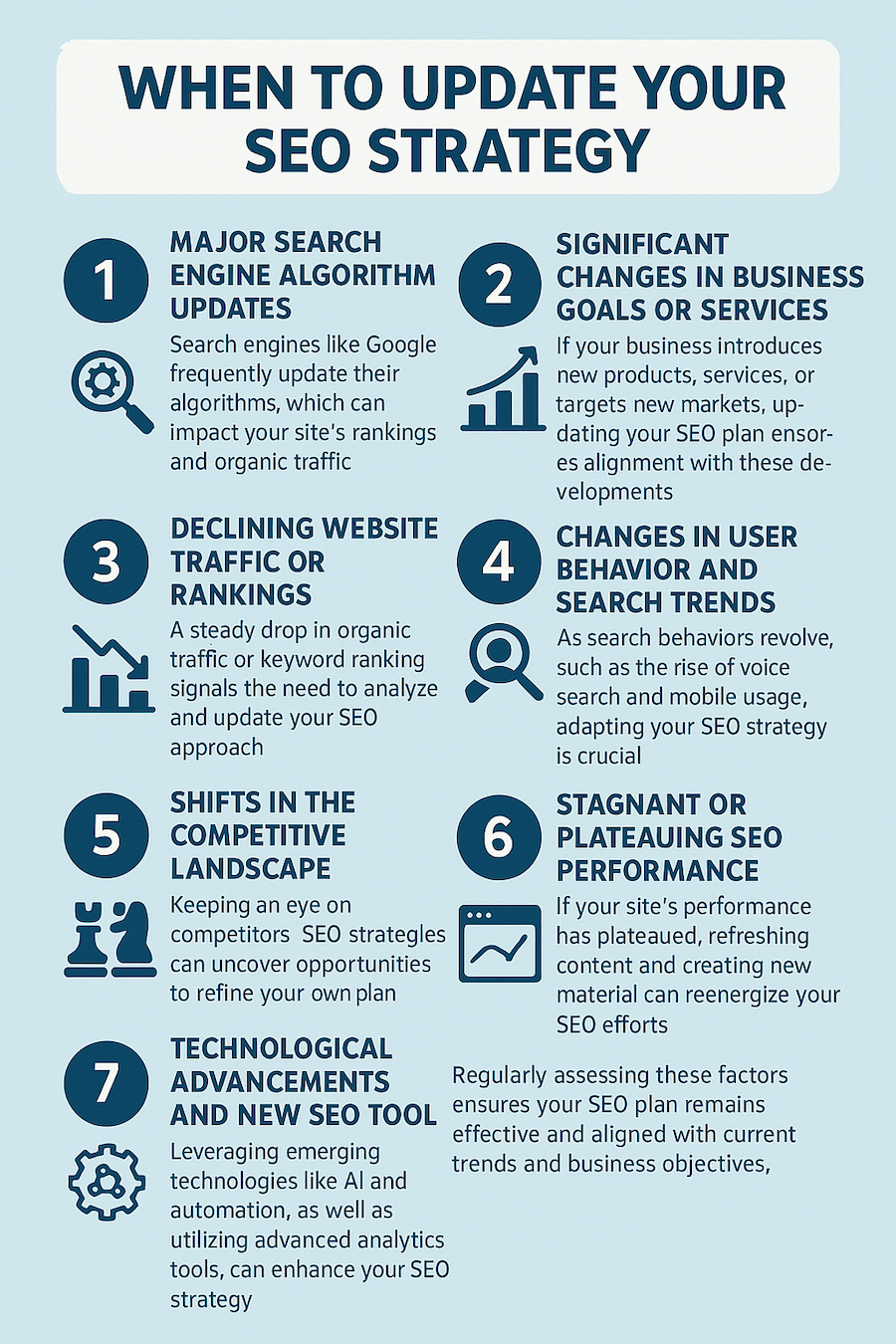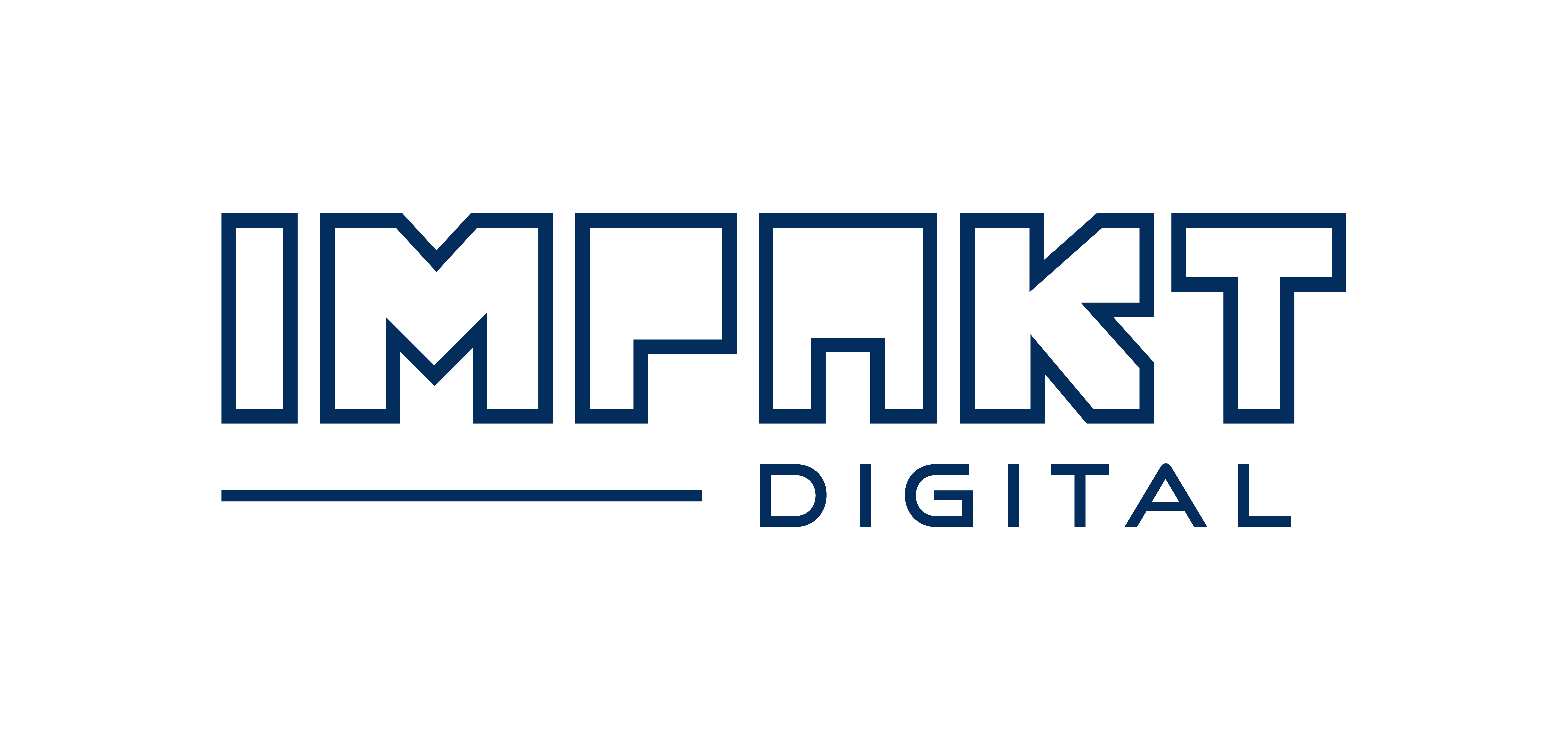
In today’s digital world, SEO is essential for businesses that want to succeed online. But it’s not a set-it-and-forget-it strategy. To stay competitive and maintain visibility, updating your SEO plan is crucial. The question is: when should you consider revisiting your SEO strategy?

This guide will break down key indicators to help you know when it’s time to adjust your SEO plan and keep your site optimized.
1. Major Search Engine Algorithm Updates
Search engines like Google frequently update their algorithms to improve user experience. These updates can affect your rankings, visibility, and organic traffic, often without warning.
How Algorithm Updates Affect Your Rankings
Search engines use complex algorithms to determine where your website ranks in search results. Major updates, like Google’s Core Updates, Penguin, or Panda, can shake up these rankings. For example, Penguin penalized websites for low-quality backlinks, and Panda targeted sites with thin or duplicate content. If your website suddenly experiences a drop in rankings after an algorithm update, it’s a clear sign that your SEO strategy may need adjustment.
Monitoring Algorithm Changes
Staying on top of these changes is essential. Using tools like MozCast or SEMrush Sensor helps monitor how algorithm changes may be impacting your site. Additionally, keeping up with industry news about upcoming updates will give you time to prepare and adjust your SEO strategy.
2. Significant Changes in Business Goals or Services
Your SEO strategy should align with your business objectives. If your business evolves, your SEO plan should too.
SEO for New Products, Services, or Target Markets
If you introduce new products, or services, or expand to new markets, your existing SEO strategy might not cover relevant keywords, audiences, or regions. For instance, if you’re launching a new service or expanding internationally,local SEO might need updating to target new keywords or regions. This helps your website maintain relevancy in search results and reach your intended audience.
Rebranding or Website Redesign
When undergoing a rebrand or redesign, you should ensure that SEO elements—such as meta tags, internal linking, and on-page content—are not only preserved but optimized. A website redesign might improve the user experience, but without careful SEO attention, it could lead to a loss in traffic.
3. Declining Website Traffic or Rankings
If you notice a steady drop in organic traffic or keyword rankings, it’s time to revisit your SEO plan.
Analyzing Traffic Drops
Declines in traffic can be caused by many factors, such as changes in search engine algorithms, content relevance, or technical SEO issues. Use tools like Google Analytics and Google Search Console to identify the source of the decline. Look at organic traffic trends, bounce rates, and time on the page to understand user behavior.
Conducting a Technical SEO Audit
Performing a technical audit can help uncover issues that might not be immediately visible. Broken links, slow page speeds, poor mobile usability, or indexing problems can hinder your rankings. A thorough audit can help fix these technical issues and improve both user experience and search engine visibility.
4. Changes in User Behavior and Search Trends
Search behavior evolves, so your SEO plan should too. The way people search today is drastically different from even five years ago.
Optimizing for Voice Search and Mobile-First Indexing
With the rise of voice search and mobile usage, it’s crucial to optimize for these trends. Voice search queries tend to be longer and more conversational, so adjusting your keywords to target these phrases will increase visibility. Additionally, Google’s mobile-first indexing means your site must be optimized for mobile devices. Faster loading times, responsive design, and mobile-friendly content are key factors in maintaining or improving rankings.
Leveraging New Keyword Trends
Keyword research isn’t a one-time task. Search trends constantly evolve as users become more specific in their queries. For example, there’s been a shift from generic keywords to more specific long-tail keywords. Regularly updating your keyword research ensures that your content remains relevant to current search behaviors.
5. Competitive Landscape Has Changed
Keeping an eye on your competition can reveal opportunities to adjust your SEO strategy.
Conducting Competitive SEO Analysis
Tools like Ahrefs or SEMrush can help you analyze your competitors’ SEO strategies. Pay attention to their content, keywords, backlinks, and overall search performance. Are they ranking for keywords that you’re not? Are they producing content that drives more traffic? By identifying gaps in your own strategy, you can adjust to stay competitive.
Adjusting Your SEO Strategy Based on Competitor Actions
If your competitors are ranking higher for certain keywords, it’s time to reevaluate your approach. Consider creating more in-depth content, acquiring better-quality backlinks, or targeting niche keywords that your competitors are overlooking.
6. Stagnant or Plateauing SEO Performance
Even if your SEO is doing well, it’s important to keep pushing forward.
Refreshing Existing Content
One of the easiest ways to boost SEO is by refreshing old content. Search engines favor websites that regularly update their content. Revisiting older blog posts or pages to add new information, optimize keywords, or include fresh media can improve rankings.
Creating New, High-Quality Content
SEO is largely driven by high-quality content. If your site hasn’t seen any new content in a while, it may be time to implement a content creation strategy. Focus on creating long-form, evergreen content that answers your audience’s key questions.
Related Reading – SEO vs SEA – A Complete Guide
7. Technology Advancements and New SEO Tools
SEO technology is constantly advancing, and it’s important to stay up to date.
Incorporating AI and Automation in SEO
Artificial intelligence and automation tools are becoming more prevalent in SEO. AI-driven SEO tools can help with tasks like content optimization, keyword analysis, and even generating insights into user behavior. Leveraging these advancements can streamline your SEO efforts and improve your website’s performance.
Utilizing Advanced Analytics and Tracking
Regularly monitoring your performance metrics, such as conversion rates and organic click-through rates (CTR), is essential. Tools like Google Data Studio can help you create custom reports to track your SEO efforts and understand what areas need improvement.
Conclusion: Partner with Impakt Digital for SEO Success
If keeping up with SEO changes seems overwhelming, Impakt Digital can help. Our team of SEO experts stays ahead of the curve to ensure that your website remains optimized, no matter what changes occur in search engines or your business. Whether you need a complete SEO strategy overhaul, content updates, or technical audits, Impakt Digital offers comprehensive services to meet your business goals.
At Impakt Digital, we understand that SEO is not a one-size-fits-all solution. We take the time to understand your unique business needs, ensuring a tailored approach to improving your website’s performance. Ready to take your SEO to the next level? Contact us today to see how we can help you stay competitive and drive long-term growth.
FAQs
Does SEO need to be updated?
Yes, SEO needs to be updated regularly. Search engine algorithms, user behavior, and market conditions are constantly changing. Failing to update your SEO plan can result in a loss of rankings, decreased traffic, and missed opportunities to attract new customers.
How often should I update my SEO plan?
The frequency of updating your SEO plan depends on factors like algorithm changes, shifts in business goals, and changes in user behavior. A good rule of thumb is to review your SEO plan every 6-12 months, or whenever a major change occurs in your business or the digital landscape.
What happens if I don’t update my SEO plan?
If you don’t update your SEO plan, you risk losing visibility in search engine results, which can lead to decreased traffic and conversions. Your competitors might outrank you, making your site irrelevant for important keywords.




